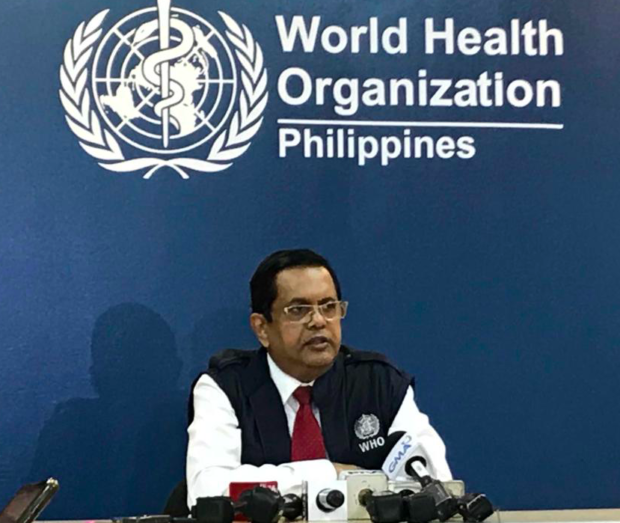
Dr. Rabindra Abeyasinghe, WHO representative to the Philippines. INQUIRER.net file photo / Cathrine Gonzales
MANILA, Philippines — The Philippines should make better its probing efforts to determine sources of COVID-19 infections as the number of COVID-19 cases continues to swell, the World Health Organization’s (WHO) Philippine representative Dr. Rabindra Abeyasinghe said Monday.
In a televised briefing, Abeyasinghe also said the Philippines should strengthen its COVID-19 testing and contact tracing.
“Where is the transmission actually happening? Is it limited to social gatherings in families or among friends? Is it also being driven by gatherings at worksites and dormitories?” Abeyasinghe said.
“This kind of investigation at the local government level is critically important so that we identify those mass-amplifying events and do everything possible to minimize the occurrence and the repeat occurrence of such situations,” he added.
By doing this, Abeyasinghe said the public could be informed how to protect themselves from these sources of COVID-19 transmission.
“This is an area that we have not been able to strengthen over the last few months. Maybe this is an opportunity for us to focus on that and identify those settings where we see transmission happening and to share that information with the public so that the public could avoid those places and protect themselves more effectively,” he said.
The government has imposed stricter restrictions on Metro Manila, Bulacan, Cavite, Laguna, and Rizal – creating a “bubble” of general community quarantine (GCQ) – until April 4 in a bid to suppress the quickly rising COVID-19 cases.
READ: FAQs: What’s a GCQ bubble?
Among the measures revived was barring non-essential travel to and from the mentioned GCQ areas or “GCQ bubble,” prohibiting religious gatherings, and imposing a common curfew from 10 p.m. to 5 a.m. but excluding workers.
RELATED STORIES
Tourism, staycation within ‘GCQ bubble’ allowed – PNP OIC Eleazar
LIST: PNP sets up 20 quarantine control points in Greater Metro Manila area

